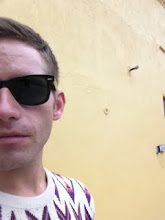
I picked up artist Keith Haring's journals at Bookmarc a few weeks ago. Say what you will about Marc Jacobs' hellbent determination to overtake the West Village, and about the undeniable charms of Biography Bookshop which occupied the space intially, but Bookmarc is really quite lovely. As many have noted, it's exceedingly well-curated and offers an impressive range of art books, biographies, pop, miscellanea and various tidbits. It's lovely and engaging and showcases some real gems.
I'm a fiction loyalist, however over the past few years I've developed a keen appreciation of biography and non-fiction, particularly interviews, diaries, journals, and memoirs. I think the gold standard is Andy Warhol's collected diaries, which are an immense collection of recorded phone conversations he made over the years. Coupled with Victor Borkis' seminal biography, both provide a well-textured portrayal of the enigmatic figure. Diana Vreeland's memoir, D.V., which I had wanted to read since hearing it referenced in To Wong Foo, Thanks for Everything, Julie Newmar, similarly captures her voice and candor.
Before stopping picking this up, I didn't know much about the life of Keith Haring. I knew the images, of course, but was unfamiliar with the artist himself. Since wrapping up the journals on my flight back from San Francisco earlier this week, I've fallen for him. I can't help but feel that there's something very romantic about his artistic struggle in his early years and the progress he made in conceptualizing and intellectualizing his work over time. It's also the undeniable romance of New York in the early 80s, something we all missed out on. For me, it's the great party I didn't go to but keep hearing about the day after. That'd be the time period I would revisit if I could.
While the journals are more about his work and glib observations on art -- on Matisse he says "too many drawings of tits and ass, I'd think he'd get bored" -- there are candid glimpses into his personal life, the tumult of notoriety, the general fabulosity of being close friends with Grace Jones, etc. What struck me most is how, despite global notoriety, Haring remained so naive and insecure in many ways, and also so loving and devoted to children and humanity.
It's also an incredible glimpse into a time where the gay experience in America was quite different. Haring came of age in the era before AIDS, and when the disease led to the death of several friends, viewed contracting it as an inevitability. There's a heart-wrenching anecdote of when Haring finds out he has AIDS, he walks down Houston to the East River, cries, and then makes the decision to live as long as he can, and to produce as much art as he can before it's too late.
It's impossible not to be moved. In many ways Haring is emblematic of a generation of lost and disenfranchised gay voices. There's a lot there -- why hasn't there been a film about his life yet?


No comments:
Post a Comment